If you’re asking if silver go bad, the answer is no. Unlike perishable commodities, silver, being a stable chemical element, does not degrade or “expire” over time. However, it can still be affected in specific ways, which might be interpreted as “going bad”.
Silver may become tarnished or corroded if it comes into contact with certain chemicals or environmental factors. For instance, silver accessories can tarnish if exposed to sulfur or hydrogen sulfide in the atmosphere, or when they come into contact with skincare products like lotions, makeup, and others. Similarly, silver can also corrode when exposed to chlorine or other chemicals typically found in swimming pools or hot tubs.
Furthermore, silver is not impervious to physical damage like scratches or dents as it’s a relatively soft metal. Therefore, it’s advisable to store silver accessories in a cool, dry place, separate from other items that could potentially cause damage.
You may also wonder: does gold go bad?
Does silver go bad?
No, silver does not “go bad” or deteriorate over time as it’s a stable chemical element. However, it can be affected or altered under certain conditions.
Silver can become tarnished if exposed to sulfur or other certain chemicals, which can cause a blackish or grey discoloration on its surface. This is especially common when silver comes into contact with cosmetics, lotions, or other personal care products, or if it’s exposed to a high level of humidity. Moreover, silver can also corrode when exposed to harsh substances such as chlorine in swimming pools or hot tubs.
Physical damage like scratches or dents can also harm the appearance of silver, as it is a relatively soft metal. To prevent such damage and maintain its aesthetic appeal, silver items should be properly stored in a dry, cool place, away from other items that could scratch or dent it.
However, tarnishing or minor physical damages do not mean silver has “gone bad” — they can often be remedied with professional cleaning or restoration.
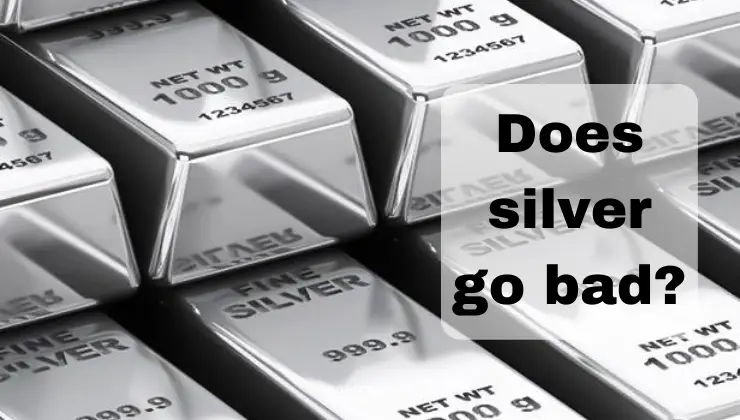
Does silver tarnish or decay?
Silver, a chemical element, does not decay like food or other perishable items. However, it can tarnish or corrode when exposed to certain chemicals or environments.
Tarnishing is a surface discoloration that occurs when silver contacts sulfur or hydrogen sulfide in the atmosphere or skincare products like lotions and makeup. Corrosion is surface damage caused by chemical reactions, typically when silver is exposed to chlorine or other chemicals found in pools or hot tubs.
Both tarnishing and corrosion are reversible and can be professionally cleaned or restored by a jeweler.
Silver, being a relatively soft metal, can be scratched or dented easily. Therefore, to prevent damage and maintain its appearance, silver accessories should be stored in a cool, dry place, away from other items that could potentially cause harm.
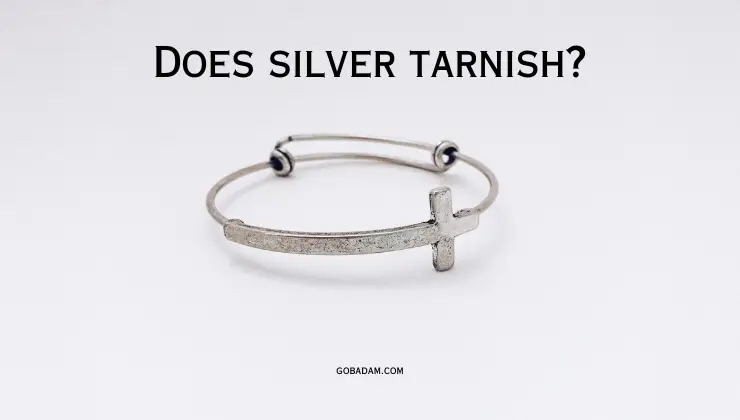
How can one tell if silver is in a bad state?
Silver, being a stable chemical element, does not deteriorate or “go bad” over time. However, it can be affected in certain ways, and here are some signs that silver may be damaged:
- Tarnishing: This occurs when silver is exposed to sulfur or hydrogen sulfide in the air, or when it comes into contact with skincare products like lotions, makeup, and others. Tarnish appears as a dark discoloration on the silver surface.
- Corrosion: Silver can corrode when exposed to chlorine or other chemicals typically found in swimming pools or hot tubs. Corrosion manifests as a dull, rough, or pitted surface on the silver.
- Scratches or dents: Being a relatively soft metal, silver is prone to physical damage in the form of scratches or dents.
- Fading of color: Silver-plated items or alloys may exhibit color fading over time due to wear and tear or exposure to certain chemicals.
Note that in most cases, these signs of damage or alteration can be repaired or restored. It is advisable to consult a professional jeweler if you have any doubts about the condition of your silver.
What’s the best way to store silver?
To prevent damage, silver should be stored in a cool, dry place, away from sunlight and humidity.
- Sealed container: It is recommended to store silver in a sealed container or bag to prevent exposure to air and humidity.
- Soft fabric: To avoid scratches and nicks, wrap the silver in a soft fabric, such as cotton or velvet, before storage.
- Jewelry box: A compartmentalized jewelry box is a great way to keep silver accessories organized and safe.
- Safety deposit box: For valuable silver items, a safety deposit box at a bank or another secure location is recommended.
Avoid exposing silver to extreme temperatures, humidity, and direct sunlight, as these conditions can lead to tarnishing, discoloration, and other forms of damage.
Separate different types of jewelry to prevent scratches, dents, and other types of damage.
Regular cleaning: Keep your silver jewelry clean to remove dirt and grime that can lead to damage over time.
DISCOVER 👉🏻 silver cleaning kit
Silver alloys may react differently to environmental conditions, so follow the manufacturer or jeweler’s specific storage recommendations.
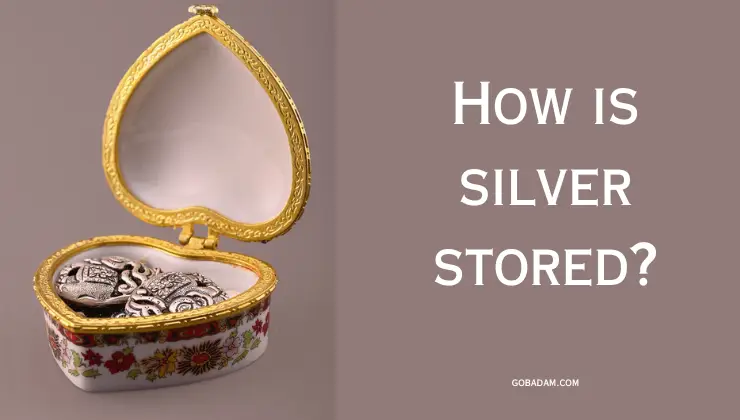
How to identify bad silver?
While there are methods to identify poor-quality silver, it’s crucial to note that some counterfeit silver items can be very convincing. Here are some ways to spot bad silver:
- Check for a hallmark: Real silver jewelry often carries a stamp indicating its purity, such as “.925” (indicating 92.5% silver, also known as sterling silver). The absence of a hallmark might indicate that the silver is fake.
- Weight comparison: Silver is a dense metal, and thus should feel heavy. If a silver item feels suspiciously light, it might be fake.
- Color inspection: Genuine silver has a distinctly white, shiny metallic hue, but counterfeit silver may vary in color.
- Magnet test: Silver is not magnetic, so if a supposed silver piece is attracted to a magnet, it is probably fake.
- Price check: A significantly lower price than comparable silver items might be an indication of fakery.
- Professional appraisal: A professional appraiser can accurately determine the authenticity of a silver item.
Even though these methods are not infallible, they can be quite helpful. If you have any doubts about a piece of silver jewelry, it’s always best to consult with a professional appraiser.
What’s the lifespan of silver jewelry?
Silver jewelry can last for many years, if not decades, because silver, a stable chemical element, does not degrade or “expire”.
However, various factors such as the type of silver used, the storage and care it receives, and the frequency of its use, all influence its lifespan.
Pure silver is relatively soft and malleable, making it susceptible to scratches, dents, and other forms of damage. Lower-grade silver alloys are more durable than pure silver but are still susceptible to scratches and dents over time.
Proper storage and care, including keeping silver jewelry in a sealed container or bag, avoiding direct sunlight and humidity, and regular cleaning can prolong its life.
The frequency of use also impacts a silver item’s lifespan. Daily worn items like rings or bracelets will naturally show signs of wear over time, whereas occasionally worn necklaces might last longer.
Even with proper care and storage, silver jewelry will eventually show signs of wear and may require repair or restoration by a professional jeweler.
Overall, with proper care and maintenance, silver jewelry can last for many years. However, remember that it’s not everlasting and will require periodic maintenance.
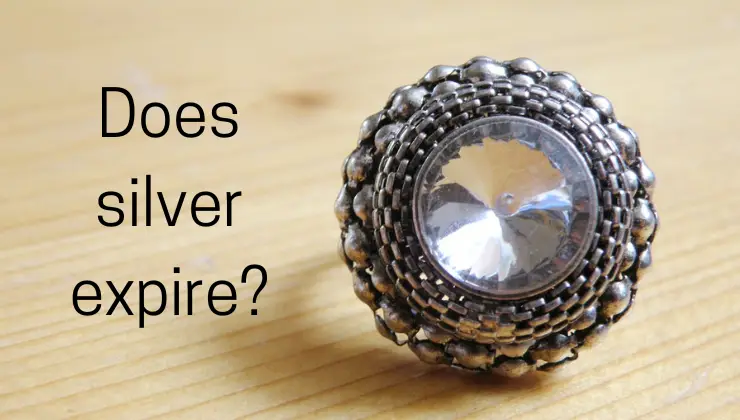
Questions about Does Silver Go Bad
In this section, we’ll answer some common questions about silver expiration and storage:
Does Silver experience deterioration with the passage of time?
No, silver doesn’t deteriorate over time since it’s a stable chemical element. However, it can be affected or altered under certain conditions.
What’s the lifespan of silver?
The lifespan of silver can be indefinite. With proper care and maintenance, silver can last for a very long time.
What results in the tarnishing or corrosion of silver?
Silver can become tarnished if exposed to sulfur or other certain chemicals. It can also corrode when exposed to harsh substances such as chlorine in swimming pools or hot tubs.
Is it possible for silver jewelry to get damaged as time passes?
Yes, silver jewelry can be damaged over time. Physical damage like scratches or dents can harm the appearance of silver as it is a relatively soft metal.
What are the factors that impact the durability of silver?
Factors that can influence the longevity of silver include exposure to chemicals, physical wear and tear, storage conditions, and the type of silver alloy used.
How does exposure to various chemicals influence silver?
Exposure to certain chemicals can cause silver to tarnish or corrode. This includes cosmetics, lotions, personal care products, sulfur, and chlorine.
In what ways can the physical condition of silver be altered?
Physical damage, such as scratches or dents, can alter the appearance of silver, impacting its aesthetic appeal.
What measures can be taken to prevent silver from getting spoiled?
To prevent damage, silver items should be properly stored in a dry, cool place, away from other items that could scratch or dent them. Regular cleaning can also help maintain its quality.
Can tarnished silver be made good as new?
Yes, tarnishing or minor physical damages do not mean silver has “gone bad”. They can often be remedied with professional cleaning or restoration.
What are some best practices for storing silver to ensure its durability?
Silver should be stored in a dry, cool place and kept separate from other items that could cause physical damage. It’s also recommended to clean silver items regularly to maintain their quality.
How frequently should silver be cleaned for its upkeep?
The frequency of cleaning depends on the usage and storage conditions. However, regular cleaning can help prevent tarnish and maintain the shine and quality of silver.
Is it possible for silver jewelry to go bad if not stored appropriately?
While silver does not “go bad”, improper storage can lead to tarnishing, discoloration, or physical damage, which can impact its aesthetic appeal.
Does the choice of silver alloy have an effect on its durability?
Yes, different silver alloys may react differently to environmental conditions and wear and tear, affecting their longevity.
How does wear and tear over time influence the lifespan of silver?
Regular wear and tear can result in physical damage such as scratches or dents, which can alter the appearance of silver and shorten its lifespan.
How can you identify if your silver has been tarnished or damaged?
Tarnishing on silver appears as a blackish or grey discoloration on its surface. Physical damage like scratches or dents can also be visible signs of damage.
What precautions should be taken to protect silver from tarnishing or corrosion?
Precautions include proper storage, regular cleaning, and avoiding exposure to harmful chemicals such as sulfur and chlorine.
Is tarnishing a signal that silver has turned bad?
No, tarnishing does not mean silver has “gone bad”. It is a surface reaction that can be cleaned or restored by a professional.
Does silver have a reaction to certain environments or substances?
Yes, silver can react to certain chemicals and environments, leading to tarnishing or corrosion.
How does the level of humidity affect the durability of silver?
High levels of humidity can cause silver to tarnish faster. Thus, it’s important to store silver in a dry environment to maintain its quality.
How can professional cleaning contribute to the extended lifespan of silver?
Professional cleaning can help remove tarnish and restore the shine and quality of silver, contributing to its extended lifespan.
More…
👉🏻 Can surge protectors go bad?

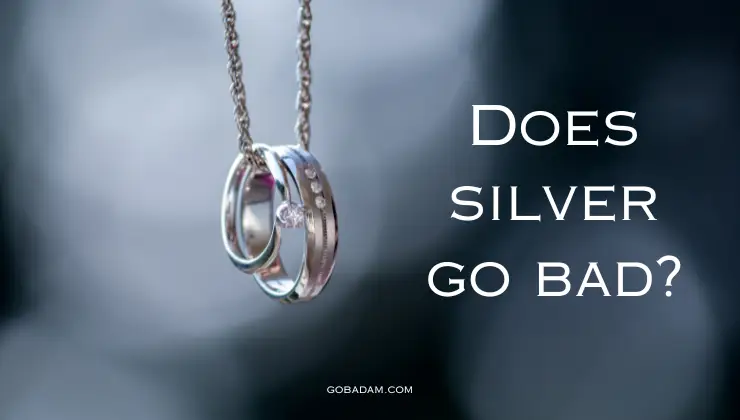
Hi there! Do you know if they make any plugins to help with Search Engine Optimization? I’m trying to
get my site to rank for some targeted keywords but I’m not seeing very good success.
If you know of any please share. Appreciate it!
I saw similar article here: Escape rooms hub
Awsome article and right to the point. I am not sure if
this is in fact the best place to ask but do you
guys have any ideea where to get some professional writers?
Thank you 🙂 Escape room lista
I don’t normally comment but I gotta say regards for the post on this amazing one : D.
You have mentioned very interesting points! ps nice website.!